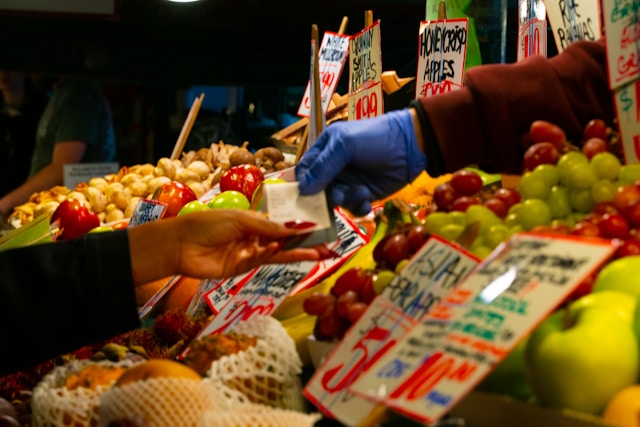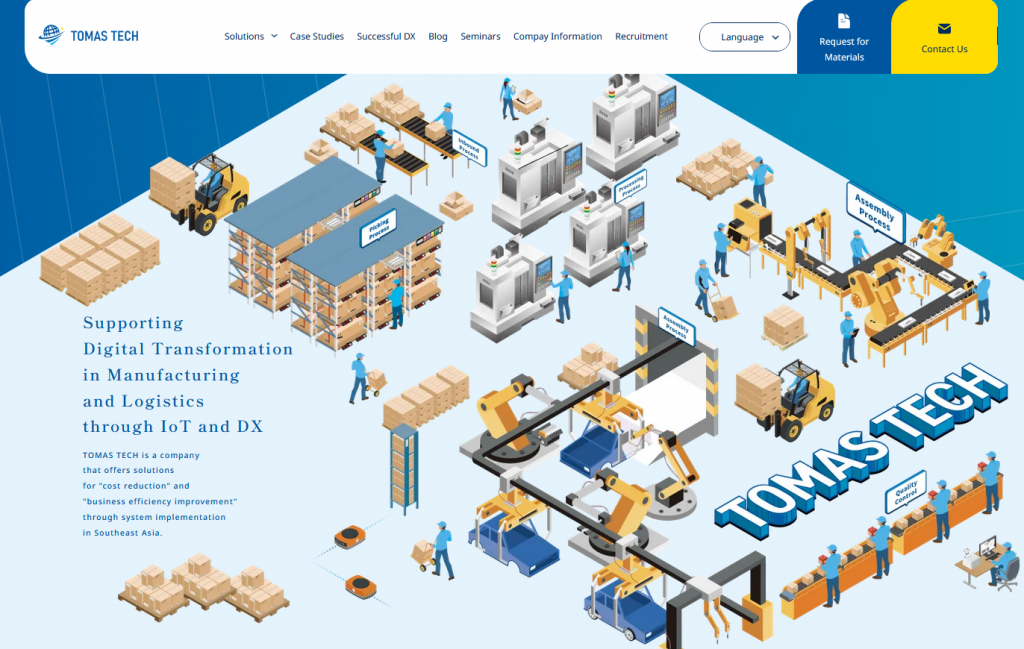In today’s world, where global supply chain transparency is increasingly demanded, the importance of traceability is rapidly growing in Thailand’s manufacturing sector. Factors such as stricter regulations by the U.S. FDA, EU standards on human rights and environmental protection, and the Thai government’s digital transformation (DX) support policies have dramatically reshaped the business landscape.
Without establishing systems to prove “who, when, where, and how” products were made, companies risk losing business opportunities and increasing risks.
This article clarifies the background behind traceability implementation, examines regulatory trends domestically and internationally, outlines practical benefits from implementing traceability, and highlights key points of support from TOMASTECH. It also addresses phased approaches suitable for SMEs, and how to handle concerns related to education and costs.
Why is Traceability Now Critical in Thailand’s Manufacturing Sector?

From here, we will explain why traceability is currently attracting attention in Thailand’s manufacturing industry.
Heightened Global Demand for Supply Chain Transparency
The manufacturing environment has significantly changed in recent years. Issues such as logistical disruptions caused by COVID-19, illegal fishing (IUU), and child labor have intensified calls for transparency from overseas partners and consumers regarding “where, who, and how products are made.”
These requirements extend beyond food production into manufacturing sectors like automotive and electronics. For instance, Europe emphasizes “responsible sourcing” and “sustainable supply chains,” increasing demand for transparency in procurement sources. Consequently, digital visualization of the entire manufacturing process through traceability has become crucial to maintaining competitiveness.
Actions by the Thai Government and Regulatory Authorities
In 2025, the U.S. FDA announced a 30-month delay in implementing mandatory traceability requirements for food producers, extending the compliance deadline to mid-2028. Thailand’s Ministry of Commerce has urged exporters to accelerate their preparations, warning that delaying preparations could lead to last-minute operational challenges.
Companies exporting processed foods or seafood to the U.S. must now clearly identify covered products and record-keeping requirements, and prepare appropriate data recording and submission systems.
Reference: FDA Intends to Extend Compliance Date for Food Traceability Rule(U.S. Food and Drug Administration)
DX Initiatives in Thailand: Industry 4.0 and BCG Policy Support
Domestically, the Thai government supports traceability enhancements through the “Thailand 4.0” policy, emphasizing smart manufacturing. The BOI (Board of Investment) provides investment incentives, including corporate tax exemptions, for introducing traceability-capable systems. Furthermore, the BCG (Bio-Circular-Green) economic model highlights sustainable production and traceability, particularly in agriculture, fisheries, and environmental sectors.
This governmental support addresses growing concerns in manufacturing plants about limitations of paper and Excel-based processes, making now an optimal time for strengthening traceability.
参照元:Thailand Board of Investment(Office of the Board of Investment, Kingdom of Thailand)
Benefits of Implementing Traceability in Thailand’s Manufacturing

From here, we will explain the benefits of introducing traceability in Thailand’s manufacturing industry.
Error Prevention and Poka-Yoke
The primary benefit of introducing traceability is the reduction of human error.
In manufacturing, mistakes such as mixing up parts or omitting steps inevitably occur.
With process management utilizing barcodes and QR codes, even if a worker mistakenly selects the wrong part, the system immediately detects the error.
This instills poka-yoke (mistake-proofing) in the workplace and prevents quality issues before they occur.
Additionally, since records of who, when, and where the work was performed are retained, this can also be utilized for preventing recurrence.
By establishing a system where machines verify input and output, workers also gain a sense of psychological reassurance.
Enhanced Process Visibility and Productivity
Traceability is effective not only for quality assurance but also for visualizing processes.
It allows you to see in real time “what is in each process” and “how far along the progress is.”
For example, if there is a supply stoppage of parts on Line A, this information can be immediately detected on the management screen.
As a result, it becomes possible to identify bottlenecks and analyze the operating rates of each process.
Additionally, as performance data accumulates, it becomes possible to quantitatively evaluate metrics such as “time required per product” and “changeover time.”
This enables improvements in overall productivity, including lead time reduction, inventory optimization, and enhanced delivery compliance rates.
Quick Regulatory Compliance and Audit Trails
Another major advantage is the speeding up of audits and complaint handling.
Even in the unlikely event of defects or quality issues, the history of the relevant lot can be traced immediately.
If you manage this information using paper ledgers or Excel, it takes time to compare and search for information.
On the other hand, with a traceability system, you can confirm “which materials were used,” “who processed them,” and “where they were shipped” in a matter of seconds.
This is particularly important in industries with strict regulations, such as food manufacturing and automotive parts.
It not only helps maintain customer trust but also directly contributes to improving the company’s quality assurance system.
Regulatory and Certification Trends: Food, GLOBALG.A.P., etc.

From here, we will explain in detail about regulatory and certification trends, such as food and GLOBALG.A.P.
米国FDAの食品トレーサビリティ義務と準備状況
In the United States, traceability requirements for food businesses have been strengthened.
This is part of the Food Safety Modernization Act (FSMA) and went into effect in 2023.
It applies to “listed foods” that are classified as high-risk foods, including nuts, leafy vegetables, and seafood.
All businesses that handle these foods are required to keep records of “who, when, where from, and where to” they shipped the products and be able to submit them immediately.
In March 2025, the FDA officially announced a 30-month extension of the grace period, effectively postponing the deadline for compliance until mid-2028.
However, the Thai Ministry of Commerce has issued a warning to exporting companies, urging them not to become complacent due to the extended grace period and to expedite the establishment of necessary systems.
For companies exporting food products from Thailand to the United States, the digitalization of records and the establishment of a traceability system are essential at this time.
Delaying preparations could potentially lead to future transaction risks.
ASEAN・GLOBALG.A.P./Chain of Custody Certification Trends
GLOBALG.A.P. (Global Gap) certification has been gaining attention in recent years as an international traceability standard.
This is an international standard that certifies production processes that take into consideration the safety, environment, and labor conditions of agricultural and marine products.
Furthermore, starting in 2024, the “Chain of Custody (CoC)” certification system for distribution stages will also be expanded.
This allows processors and distributors to consistently prove that products come from certified farms.
In Thailand, the acquisition of GLOBALG.A.P. and ThaiGAP certifications is accelerating, particularly among fresh produce and seafood companies targeting exports.
Some companies are combining multiple certifications, such as “GLOBALG.A.P. + HACCP + CoC,” to enhance credibility for European and Japanese markets.
While obtaining certification requires time and effort, considering the benefits of securing trust from business partners and preferential treatment in export markets, it can be said to offer sufficient investment returns.
Future Regulatory Forecasts and Corporate Response Measures
Even in manufacturing industries other than food, stricter legal regulations regarding traceability are expected.
In the EU, the Corporate Sustainability Due Diligence Directive (CSDDD) is expected to be introduced, requiring companies to disclose environmental and human rights risks throughout their supply chains.
Going forward, we will enter an era where not only “how it was made” but also “who made it” and “what the working conditions were like” will be scrutinized.
To respond to this trend, it is essential to establish a system that can accurately and quickly provide historical information.
For small and medium-sized manufacturing companies in particular, the transition from “paper-based storage” to “digital tracking” will be a major challenge.
To prepare for future risks, it is necessary to clarify in advance, by comparing with your company’s business processes, how much historical information should be retained and which areas should be made transparent.
TOMASTECH provides traceability DX support for the Thai manufacturing industry.

From here, we will explain the Traceability DX Support provided by TOMASTECH.
Manufacturing Execution Control Support via MES Integration
TOMASTECH offers solutions that combine Manufacturing Execution Systems (MES) with traceability management.
This allows comprehensive monitoring of the entire process flow, from raw material receipt through processing, inspection, and shipping. For example, you can record all information, such as “when, who, with which equipment, and which lot was used to produce the product,” as data.
This information can also be integrated with ERP systems and inventory management systems, facilitating smooth information sharing across departments. Real-time monitoring of progress in each process step and identification of defect occurrences directly enhance quality improvements and delivery management accuracy.
TOMASTECH’s strength lies in simultaneously achieving not just historical data management but also “visualization of the manufacturing floor” and “operational improvement.”
Error Prevention (Poka-Yoke) & Barcode/QR Code Environment Setup
An indispensable aspect of practical traceability implementation is an automated data reading environment using barcodes and QR codes.
TOMASTECH consistently supports the entire process, including product label design, scanner and handheld terminal implementation, and form template creation.
This system effectively prevents human errors, such as workers selecting incorrect parts or missing data entries. During operation, the system can guide operators through screen displays, asking “Is this the correct part?” or “What is the next process?” thereby establishing a Poka-Yoke environment where anyone can perform tasks correctly.
The data read is immediately recorded as actual results, stored in real-time either on the cloud or locally, reducing transcription and manual entry efforts. The design, which ensures accurate historical data management without burdening operators, highlights TOMASTECH’s expertise based on practical field knowledge.
Regulatory Compliance & Audit Trail Management System Implementation
Many operations express the need to quickly retrieve historical data during audits. TOMASTECH meets these needs by constructing audit trail management systems that enable instant searching and exporting of historical data. Specifically, the system features search capabilities that extract manufacturing histories within seconds based on criteria such as part number, lot, production date, and destination. Forms and reports can be automatically converted into PDF formats, ready for submission to customers or auditing bodies.
Introducing such systems significantly accelerates responses to internal and external inquiries, reducing operational workloads. Furthermore, advanced traceability contributes to improved customer trust and transaction continuity rates, providing significant benefits to management. As a partner proficient in proposing and implementing systems tailored to real-world conditions, TOMASTECH supports many companies expanding into Thailand.
Barriers and Key Points for Successful Traceability Implementation in Thailand’s Manufacturing Industry

From here, we will discuss barriers and key points for successful traceability implementation in Thailand’s manufacturing industry.
Local Staff, Cultural Challenges, and Educational Support
When introducing a traceability system, one initial challenge is resistance and the difficulty of establishing routine operations among field staff.
Particularly in Thai factories, there are cases where system adoption is hindered by sentiments like “not comfortable with machines” or “traditional methods are easier.”
Therefore, providing practical field training and clear explanations of “why the system is necessary” and “how it can simplify operations” is essential.
TOMASTECH supports this by offering training manuals and lectures in both Japanese and Thai.
Additionally, adjustments to user interfaces and data entry fields can be flexibly made based on operator feedback.
It is precisely this “user-friendly design” and “hands-on educational support” that ensures the system takes root in the field, ultimately leading to accurate traceability operation.
Early Clarification of Costs and ROI
Another barrier is the management’s perspective of “whether the introduction costs will yield sufficient benefits.”
Implementing traceability systems involves initial investments in system development, equipment procurement, and training.
However, post-implementation results typically include reduced complaints due to human error, fewer man-hours spent on document creation, and faster audit responses, among various cost-saving benefits.
For instance, situations such as “time spent addressing quality defects reduced from 10 hours per month to 1 hour after implementation” are common.
TOMASTECH provides pre-implementation simplified simulations and projected benefits, helping management clearly understand the return on investment (ROI).
Evaluating both visible costs and hidden losses (effects of human errors and delayed deliveries) assists management in making informed implementation decisions.
Phased Planning from Pilot to Company-wide Deployment
An essential point for successful traceability implementation is avoiding a simultaneous company-wide rollout.
Initially, it is effective to start with a pilot introduction (Proof of Concept: PoC) on a small scale, such as a specific product line or process.
For example, introducing the system first “only in the packaging process of product A,” monitoring field reactions, and then gradually expanding to “product B processes → overall manufacturing” is practical.
This phased approach helps prevent field confusion and allows flexible incorporation of system improvements.
TOMASTECH proposes customized plans for each company using a structured scheme of “Phase 1: Limited introduction → Phase 2: Expansion → Phase 3: Company-wide operation.”
By gradually accumulating success experiences, it becomes possible to build a traceability system accepted by both field staff and management.
Frequently Asked Questions about Traceability in Thailand’s Manufacturing Industry

From here, we will answer frequently asked questions about traceability in Thailand’s manufacturing industry.
Q. Is it meaningful to introduce traceability in a small to medium-sized factory like ours?
A. Yes, even small and medium-sized factories can gain significant benefits from implementation.
Since it directly contributes to the prevention of quality issues and increased trust from customers, it is important regardless of factory size.
Especially in manufacturing sites with a wide variety of parts, recording “who, when, and which material was used” helps in early error detection and recurrence prevention.
At TOMASTECH, a small start targeting a single process or product line is also possible.
We recommend gradually experiencing the benefits while considering a company-wide rollout.
Q. We are concerned whether our Thai staff can handle the system. Is there any support system?
A. Rest assured. TOMASTECH provides support through a mixed team of local Thai staff and Japanese managers.
At the time of implementation, screen layout and operational steps can be customized to match actual field operations.
We also support the preparation of Thai-language manuals, operational lectures, and on-site assistance, providing careful support so that even workers unfamiliar with IT can operate the system.
Based on the understanding that “complex operations won’t take root in the field,” we strive for the simplest and most intuitive design possible.
Q. What is the difference between MES and a traceability system?
A. MES (Manufacturing Execution System) is a system used to manage and control “what is currently happening on the factory floor” in real time.
It broadly manages production schedules, work instructions, process progress, and work results.
On the other hand, a traceability system is a mechanism to record and trace “what happened in the past.”
For example, it allows backward tracing of questions like “What raw materials were used in this product?” and “Which lot was it, and who processed it?”
TOMASTECH integrates these two systems to provide a framework that visualizes both “present” and “past.”
This enables consistent information management, from process improvement to quality assurance.
Summary
This article has explained why traceability is increasingly important in Thailand’s manufacturing industry, along with its background and market trends.
In addition to new rules by the U.S. FDA and stricter EU regulations, Thailand’s government is also pushing DX (Digital Transformation), requiring companies to strengthen historical data management.
Benefits of implementation include the prevention of human errors, visualization of production processes, and quicker regulatory compliance—achieving both quality and efficiency.
To ensure successful implementation, key factors include training, visualizing ROI, and phased deployment.
TOMASTECH supports every step, from MES × traceability integration and Poka-Yoke environment setup to audit trail search system implementation.
With designs that align with field realities and quality control rooted in Japanese standards, we firmly support the DX of Thai factories.
Looking ahead, integration with IoT and the cloud will usher in an era where real-time and smart history management becomes the norm.
Transparency and reliability across the entire supply chain will greatly influence a company’s reputation.
“Can our factory really implement this?”
“I don’t know where to start.”
If you feel this way, please feel free to consult with TOMASTECH.
We will listen to your on-site conditions and offer a free initial diagnosis and introduction plan proposal.
As a first step toward building a “strong manufacturing system” prepared for future risks, we encourage you to contact us.


